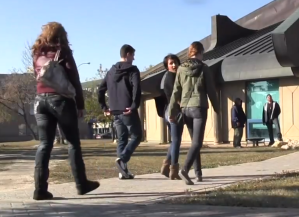By Jim Silver
An issue that needs to be addressed in the forthcoming Throne Speech on November 20th, is the persistence in Manitoba of a deep, complex and damaging poverty.
I mportant gains have been made in recent years in the fight against poverty, especially in Winnipeg’s inner city. They often emerge in the following way: people in an inner-city community identify a means of responding to a poverty-related problem, and put together a strategy based on their hands-on, “close-to-the-ground” experiential knowledge; and once a plan is in place and is determined to be viable, the provincial government invests in that community-driven initiative. This kind of partnership has produced some significant gains of late. Examples—there are many more—include: the remarkable transformation in Lord Selkirk Park, a North End public housing complex where the community mobilized and the provincial government invested, leading to big gains in a neighbourhood once thought by many to be a lost cause; the many productive investments by Neighbourhoods Alive!, including core funding for Neighbourhood Renewal Corporations that do important anti-poverty work in low-income communities; the pioneering efforts of organizations like Building Urban Industries for Local Development (BUILD) and Manitoba Green Retrofit (MGR) in moving into useful paid employment significant numbers of inner-city residents who would otherwise have difficulty finding jobs; the highly successful adult educational initiatives on Selkirk Avenue, soon to be added to by the redevelopment of the old Merchants Hotel into Merchants Corner; the significant numbers of social and affordable housing units that have been and are being built by the Province; and the introduction of the Rent Assist program, which when fully rolled out will produce results that will place Manitoba at the cutting edge of the fight against poverty.
mportant gains have been made in recent years in the fight against poverty, especially in Winnipeg’s inner city. They often emerge in the following way: people in an inner-city community identify a means of responding to a poverty-related problem, and put together a strategy based on their hands-on, “close-to-the-ground” experiential knowledge; and once a plan is in place and is determined to be viable, the provincial government invests in that community-driven initiative. This kind of partnership has produced some significant gains of late. Examples—there are many more—include: the remarkable transformation in Lord Selkirk Park, a North End public housing complex where the community mobilized and the provincial government invested, leading to big gains in a neighbourhood once thought by many to be a lost cause; the many productive investments by Neighbourhoods Alive!, including core funding for Neighbourhood Renewal Corporations that do important anti-poverty work in low-income communities; the pioneering efforts of organizations like Building Urban Industries for Local Development (BUILD) and Manitoba Green Retrofit (MGR) in moving into useful paid employment significant numbers of inner-city residents who would otherwise have difficulty finding jobs; the highly successful adult educational initiatives on Selkirk Avenue, soon to be added to by the redevelopment of the old Merchants Hotel into Merchants Corner; the significant numbers of social and affordable housing units that have been and are being built by the Province; and the introduction of the Rent Assist program, which when fully rolled out will produce results that will place Manitoba at the cutting edge of the fight against poverty.
By Shauna MacKinnon
Winnipeg’s divide is far more complex than Bartley Kives suggests in his article “High hopes for first indigenous Winnipeg mayor” (Winnipeg Free Press Saturday October 25).
Having a self-identified Métis mayor will undoubtedly dispel many of the negative stereotypes about Indigenous people that continue to be far too prevalent in our city. Our first openly gay mayor certainly had this effect on homophobia. In fact, my somewhat conservative Catholic mother changed her views about homosexuality in part because of Glen Murray. She held him in very high regard and came to understand that his sexual orientation was irrelevant. I’ve always attributed a big part of my mother’s instant openness and acceptance of my gay brother to her seeing a progressive openly gay male as a civic leader and role model.
But the divide that Kives refers to is far more complicated, and Bowman identifying himself as Indigenous will not be enough to bridge it.
By Lynne Fernandez
The above quote, by one of Swiss author Max Frisch’s characters, succinctly captures the inherent conflict between employers and workers. Employers want results; they want productivity, machine-perfect timing and energy for the lowest wage possible. Workers want a living wage, benefits, a pleasant workplace, some say over the work process. They want work/life balance so they can enjoy life after work and spend time with their families.
But in reality many work for less than a living wage in difficult circumstances. Even many union-protected new Canadian workers face challenges that seem impossible to the average Canadian. So much of the work they do is dirty, dangerous, demoralizing and exhausting. Working in hog or chicken processing plants, for example, is not only physically demanding, it assaults the spirit and breaks the heart.
By Kirsten Bernas
 There is some good news in the Province’s recently released second annual All Aboard report, which tracks poverty and social exclusion in Manitoba. However, it’s clear that much more needs to be done.
There is some good news in the Province’s recently released second annual All Aboard report, which tracks poverty and social exclusion in Manitoba. However, it’s clear that much more needs to be done.
The report looks at 21 indicators covering areas such as housing, community belonging, education, employment, earnings, poverty rates, income inequality, early learning and childcare, children in care, teen birth rates, and health.
Since the All Aboard poverty reduction and social inclusion strategy was announced in 2009, there has been a 5.3 percent increase in the number of social and affordable housing units supported by the Province, an 8% increase in graduation rates, and a 5.5 percent increase in the availability of licensed childcare.
Despite government efforts, there is still a long way to go. Poverty rates have been on a downward trend over the last decade, but have increased in recent years. The proportion of children in care of the child welfare system has risen by 29 percent. A higher proportion of urban households live in quality, affordable, and appropriate housing now than in years before the strategy, but these gains have been lost in recent years. New immigrants and Aboriginal people are more likely to live in housing that is unaffordable, unsuitable or in poor condition.
Ensuring access to affordable housing is critical to a successful poverty reduction strategy. Efforts to educate, train, and employ low income people are unlikely to be successful if they can’t access safe and stable housing. This basic need improves mental and physical health while providing a foundation from which people can access important social services and participate more fully in the community.
Manitobans who were consulted on All Aboard agree – housing was ranked highest among seven areas where government should invest more to reduce poverty and social exclusion. The Right to Housing coalition has long called for increases in the supply of social housing – where rent is geared to income. Make Poverty History Manitoba represented over 145 organizations that called for an increase to housing benefits for people on social assistance.
The Province has responded with significant commitments. This year, it fulfilled a commitment to deliver 1,500 new units of affordable housing and to support 1,500 households in accessing social housing. By 2016 it promises to build another 500 units each of affordable and social housing.
In addition, Budget 2014 introduced Rent Assist, a housing benefit available to all low income Manitobans to assist with private rental expenses. The Province has committed to increasing Rent Assist’s maximum benefit level to 75 percent of median market rent over a four-year period.
While these important commitments help address the affordable housing crisis, thousands of more units are needed to meet demand. Approximately one in ten Manitoba households live in inadequate housing. The majority of these are unable to access housing that costs less than 30 percent of their household income. Many are forced to rely on food banks as they dip into food budgets to cover shelter costs. Others end up homeless.
Clearly, there is a need for further increases to the supply of social housing. Meanwhile, the ongoing expiration of federal housing subsidies threatens to erode the supply of existing stock. While other levels of government must do their part, we must continue to call on the Province to preserve housing stock while ensuring that additions to supply are net increases and do not come at the expense of other important housing initiatives.
This requires an increase to the housing budget, which was frozen in Budget 2014. The government has found ways to increase spending on the justice and healthcare systems. Many who are incarcerated do not have access to safe and affordable housing at the time of arrest. We know that adequate housing is associated with decreased crime and better health outcomes. The Province would be wise to increase investments in housing to address the underlying factors that contribute to rising justice and healthcare costs.
Community groups will be listening to the upcoming throne speech for the government’s commitment to prioritize funding for housing. They will be expecting an increase to the housing budget in Budget 2015 to meet supply commitments without jeopardizing other important housing initiatives. They will also be expecting a significant investment in Rent Assist to bring the government much closer to meeting its target maximum benefit level of 75% of median market rent, sooner than in four years. This too must be achieved without clawing back other benefits available to low income Manitobans.
This week the Province began community consultations for Budget 2015. Legislation requires the government to take its poverty reduction strategy into account when preparing the budget. Finance Minister Jennifer Howard should heed the call of community groups that are asking the Province to prioritize housing and invest in the necessary foundation for the long-term success of Manitoba’s poverty reduction strategy.
Kirsten Bernas is Research and Policy Manager with the Canadian Community Economic Development Network and Research Affiliate with the CCPA-MB.
A version of this article originally appeared in Winnipeg Free Press, October 27, 2014
Photo: Vianney (Sam) Carriere/flickr
By Mareike Brunelli
 On October 8th, over 60 women gathered at the Circle of Life Thunderbird House on Treaty One territory to share their views on municipal issues and address mayoral candidates. This forum was different than any of the many mayoral forums in the Winnipeg election, and is a model to learn from in future civic engagement efforts.
On October 8th, over 60 women gathered at the Circle of Life Thunderbird House on Treaty One territory to share their views on municipal issues and address mayoral candidates. This forum was different than any of the many mayoral forums in the Winnipeg election, and is a model to learn from in future civic engagement efforts.
By Jim Silver
A wealth of evidence—both global and local—confirms the value of literacy, and the importance of programs that promote literacy. This is especially the case for low-income individuals and communities, for whom gains in literacy can be transformative.
By Kirsten Bernas and Lynne Fernandez

As of October 1st, minimum wage earners in Manitoba will earn $10.70 per hour – just over $20,800 annually. This leaves a family of four, with both parents working, with an income that is more than $1,500 below the poverty line. Single parent families are worse off with incomes more than $8,000 short. It is widely agreed that a job can be the best pathway out of poverty. But this is only true if wages meet basic needs.
University of Manitoba professor Patricia Martens has one more mission as an epidemiologist as she confronts her final days with a terminal disease. She wants the government to stop aiding and abetting the lethal trade in asbestos.
Martens is a prominent and distinguished research scientist in the university’s faculty of medicine. She received the Order of Canada in 2013 for her advancement of population health research and for her contributions to health policy in Manitoba. Her CV is more than 140 pages long, encapsulating a remarkable professional career.
By Molly McCracken
Last night several dozen business leaders, politicians and high profile Winnipeggers spent a night at Portage and Main in the annual CEO Sleep Out to raise funds and awareness about poverty and homelessness. However if we as a society are actually going to end homelessness, systemic change is needed.




Follow us!